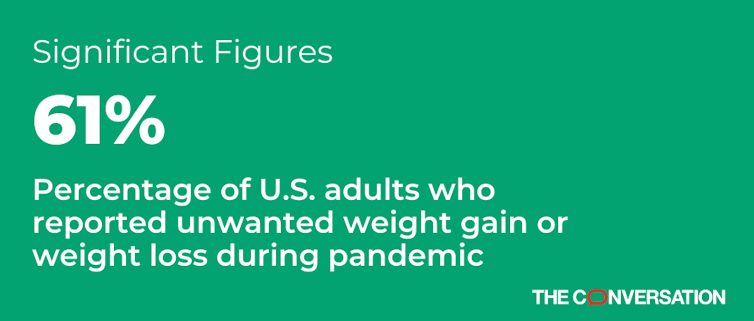Unwanted weight gain or weight loss during the pandemic? Blame your stress hormones
It's been a stressful year, and for 61% of US adults, a year of unwanted weight change too. This isn't surprising, as stress, eating and motivation are all linked through hormones in the brain.


If you have experienced unwanted weight gain or weight loss during the pandemic, you are not alone. According to a poll by the American Psychological Association, 61% of U.S. adults reported undesired weight change since the pandemic began.
The results, released in March 2021, showed that during the pandemic, 42% of respondents gained unwanted weight – 29 pounds on average – and nearly 10% of those people gained more than 50 pounds. On the flip side, nearly 18% of Americans said they experienced unwanted weight loss – on average, a loss of 26 pounds.
Another study, published on March 22, 2021, assessed weight change in 269 people from February to June 2020. The researchers found, on average, that people gained a steady 1.5 pounds per month.
I am a nutritional neuroscientist, and my research investigates the relationship between diet, lifestyle, stress and mental distress such as anxiety and depression.
The common denominator to changes in body weight, especially during a pandemic, is stress. Another poll done by the American Psychological Association in January 2021 found that about 84% of U.S. adults experienced at least one emotion associated with prolonged stress in the prior two weeks.
The findings about unwanted weight changes make sense in a stressful world, especially in the context of the body’s stress response, better known as the fight-or-flight response.

Fight, flight and food
The fight-or-flight response is an innate reaction that evolved as a survival mechanism. It empowers humans to react swiftly to acute stress – like a predator – or adapt to chronic stress – like a food shortage. When faced with stress, the body wants to keep the brain alert. It decreases levels of some hormones and brain chemicals in order to turn down behaviors that won’t help in an urgent situation, and it increases other hormones that will.
When under stress, the body lowers levels of neurotransmitters such as serotonin, dopamine and melatonin. Serotonin regulates emotions, appetite and digestion. So, low levels of serotonin increase anxiety and can change a person’s eating habits. Dopamine – another feel-good neurotransmitter – regulates goal-oriented motivation. Dwindling levels of dopamine can translate into lower motivation to exercise, maintain a healthy lifestyle or perform daily tasks. When people are under stress, they also produce less of the sleep hormone melatonin, leading to trouble sleeping.
Epinephrine and norepinephrine mediate the physiological changes associated with stress and are elevated in stressful situations. These biochemical changes can cause mood swings, impact a persons’s eating habits, reduce goal-oriented motivation and disrupt a person’s circadian rhythm.
Overall, stress can throw your eating habits and motivation to exercise or eat healthy way out of balance, and this last year has certainly been a stressful one for everyone.

Easy calories, low motivation
In both of the studies, people self-reported their weight, and the researchers didn’t collect any information about physical activity. But, one can cautiously assume that most of the weight changes were due to people gaining or losing body fat.
So why did people gain or lose weight this last year? And what explains the dramatic differences?
Many people find comfort in high-calorie food. That is because chocolate and other sweets can make you happy by boosting serotonin levels in the short term. However, the blood clears the extra sugar very quickly, so the mental boost is extremely short-lived, leading people to eat more. Eating for comfort can be a natural response to stress, but when combined with the lower motivation to exercise and consumption of low-nutrient, calorie-dense food, stress can result in unwanted weight gain.
What about weight loss? In a nutshell, the brain is connected to the gut through a two-way communication system called the vagus nerve. When you are stressed, your body inhibits the signals that travel through the vagus nerve and slows down the digestive process. When this happens, people experience fullness.
The pandemic left many people confined to their homes, bored and with plenty of food and little to distract them. When adding the stress factor to this scenario, you have a perfect situation for unwanted weight changes. Stress will always be a part of life, but there are things you can do – like practicing positive self-talk – that can help ward off the stress response and some of its unwanted consequences.
Lina Begdache receives funding from the National Science Foundation, Academy of Nutrition and Dietetics, New York State Health Foundation, Regional Economic Development Council and other foundation and intramural sources.
Read These Next
Clarence ‘Taffy’ Abel: A pioneering US Olympic hockey star who hid his Indigenous identity to play i
Despite being a foundational figure in American hockey, Taffy Abel – who hid his Ojibwe heritage so…
You’ve reached your weight loss goal on GLP-1 medications – what now?
Due to the body’s natural tendency to restore its former weight, many people regain their lost weight…
Why corporate America is mostly staying quiet as federal immigration agents show up at its doors
Federal immigration raids in Minnesota prompted a social backlash. But the business community is largely…






